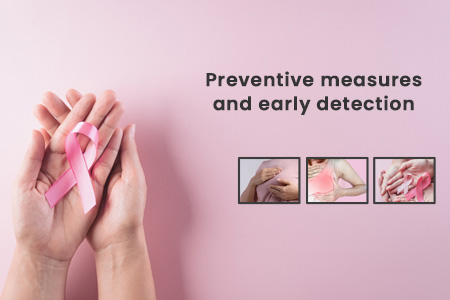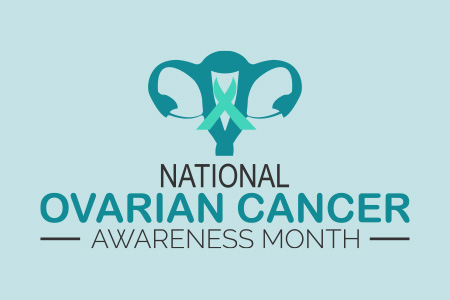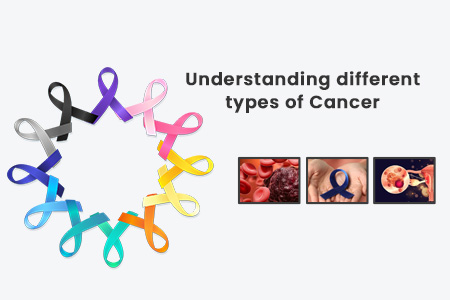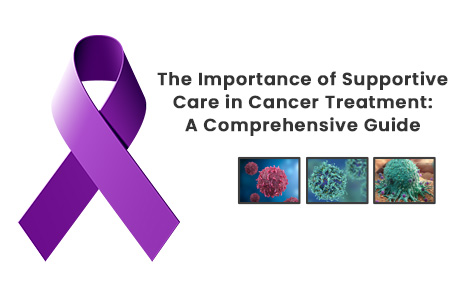
<p><span style="color: black;">Cancer is a leading cause of morbidity and mortality worldwide. While certain risk factors are beyond our control, adopting preventive measures and early detection strategies can play a crucial role in reducing the burden of cancer. In this blog, we will outline a comprehensive guide to help individuals and communities implement preventive measures and enhance early detection of various types of cancer.</span></p><p><span style="color: black;">Lifestyle Modifications for Cancer Prevention</span></p><p><br></p><p><strong style="color: black;">Healthy Diet:</strong><span style="color: black;"> A healthy diet plays a crucial role in reducing the risk of cancer. Emphasize the following dietary practices:</span></p><p><strong style="color: black;">Fruits and Vegetables:</strong><span style="color: black;"> Incorporate a variety of fruits and vegetables into your daily meals. These nutrient-rich foods are packed with vitamins, minerals, and antioxidants that help protect against cancer. Aim for at least five servings of fruits and vegetables each day.</span></p><p><strong style="color: black;">Whole Grains:</strong><span style="color: black;"> Opt for whole grains like brown rice, whole wheat bread, oats, and quinoa. These provide essential fiber and nutrients that contribute to overall health and reduce the risk of colorectal cancer.</span></p><p><strong style="color: black;">Legumes and Beans:</strong><span style="color: black;"> Include legumes such as lentils, chickpeas, and beans in your diet. They are excellent sources of plant-based protein and fiber, which promote a healthy digestive system and may reduce the risk of various cancers.</span></p><p><strong style="color: black;">Limit Processed Foods:</strong><span style="color: black;"> Minimize your intake of processed and packaged foods, which often contain high levels of unhealthy fats, added sugars, and preservatives. These have been linked to an increased risk of certain cancers, including colorectal and stomach cancers.</span></p><p><strong style="color: black;">Red and Processed Meats:</strong><span style="color: black;"> Reduce consumption of red meats (such as beef, lamb, and pork) and processed meats (such as sausages, bacon, and hot dogs). These have been associated with an increased risk of colorectal and stomach cancers. Instead, opt for lean protein sources like poultry, fish, and plant-based alternatives.</span></p><p><strong style="color: black;">Sugary Beverages:</strong><span style="color: black;"> Limit the consumption of sugary drinks such as sodas, fruit juices, and energy drinks. These beverages are often high in calories and can contribute to weight gain and an increased risk of various cancers, including breast and pancreatic cancers. Opt for water, herbal teas, or freshly squeezed juices in moderation.</span></p><p><strong style="color: black;">Physical Activity:</strong><span style="color: black;"> Regular physical activity is a cornerstone of cancer prevention. Consider the following recommendations:</span></p><p><strong style="color: black;">Aerobic Exercise: </strong><span style="color: black;">Engage in at least 150 minutes of moderate-intensity aerobic exercise, such as brisk walking, cycling, swimming, or dancing, every week. This promotes cardiovascular health, helps maintain a healthy weight, and reduces the risk of various cancers, including breast, colon, and lung cancers.</span></p><p><strong style="color: black;">Strength Training:</strong><span style="color: black;"> Include strength training exercises at least twice a week. These activities, such as weightlifting, resistance band exercises, or bodyweight exercises, help build and maintain muscle mass, improve bone density, and enhance overall physical fitness.</span></p><p><strong style="color: black;">Flexibility and Balance:</strong><span style="color: black;"> Incorporate flexibility and balance exercises, such as yoga or tai chi, into your routine. These activities improve joint mobility, posture, and stability, reducing the risk of falls and associated injuries. Tobacco and Alcohol Control: </span></p><p><span style="color: black;">Tobacco and alcohol consumption are major risk factors for several types of cancer. Implement the following measures:</span></p><p><strong style="color: black;">Tobacco Avoidance:</strong><span style="color: black;"> Steer clear of all forms of tobacco, including smoking and chewing tobacco. Smoking is strongly linked to lung cancer and increases the risk of various other cancers, including those of the mouth, throat, esophagus, bladder, and pancreas. Quitting smoking or never starting is the best way to reduce your risk.</span></p><p><strong style="color: black;">Alcohol Moderation:</strong><span style="color: black;"> Limit alcohol consumption and follow recommended guidelines. For women, it is advised to have no more than one drink per day, and for men, no more than two drinks per day. Excessive alcohol consumption has been associated with an increased risk of various cancers, including those of the mouth, throat, esophagus, liver, and breast.</span></p><p><strong style="color: black;">Sun Protection:</strong><span style="color: black;"> Excessive exposure to ultraviolet (UV) radiation from the sun or tanning beds can increase the risk of skin cancer. Apply a broad-spectrum sunscreen with a sun protection factor (SPF)</span></p><p><strong style="color: black;">Cancer Screening Guidelines: </strong><span style="color: black;">Regular cancer screenings are essential for early detection, as they can identify the presence of cancer or precancerous conditions before symptoms appear. The following are some key cancer screening guidelines:</span></p><p><strong style="color: black;">Breast Cancer: </strong><span style="color: black;">Breast cancer is one of the most common cancers affecting women. The recommended screening method is mammography, a low-dose X-ray of the breasts. Guidelines for mammograms vary differ depending on the organization, but generally, women should start regular screenings at age 40 or earlier if they have higher risk factors, such as a family history of breast cancer. It's important to consult with healthcare professionals to determine the appropriate screening schedule. In addition to mammograms, women should also perform regular self-examinations to become familiar with their breast tissue and report any changes or abnormalities to their healthcare provider promptly.</span></p><p><strong style="color: black;">Colorectal Cancer: </strong><span style="color: black;">Colorectal cancer screening is crucial for both men and women. The most common screening method is a colonoscopy, which examines the entire colon and rectum for polyps or abnormal growths. Starting at age 50, individuals at average risk should undergo regular colonoscopies every ten years. If there is a family history of colorectal cancer or other risk factors, screening may need to begin earlier or be more frequent. It's important to be aware of potential symptoms, such as changes in bowel habits, blood in the stool, or unexplained weight loss, and report them to a healthcare provider.</span></p><p><strong style="color: black;">Cervical Cancer: </strong><span style="color: black;">Cervical cancer screenings primarily involve Pap smears and human papillomavirus (HPV) tests. Pap smears collect cells from the cervix to detect any abnormal changes. The general guideline is to start Pap smears at age 21 or within three years of becoming sexually active, and then have them repeated every three years. HPV tests check for the presence of high-risk HPV strains, which can cause cervical cancer. It is recommended to combine the Pap smear with an HPV test starting at age 30, and if both results are normal, screenings can be done every five years.</span></p><p><strong style="color: black;">Prostate Cancer: </strong><span style="color: black;">Prostate cancer screenings are primarily recommended for men based on individual risk factors and preferences. The two main screening methods are the prostate-specific antigen (PSA) blood test and the digital rectal exam (DRE). The PSA test measures the levels of PSA, a protein produced by the prostate gland, in the blood. The DRE involves a healthcare provider manually checking the prostate for any abnormalities. The decision to undergo prostate cancer screening should be based on a discussion with a healthcare provider, considering factors such as age, family history, and overall health. The benefits and potential harms of screening should be weighed carefully.</span></p><p><span style="color: black;">Risk Factors and Genetic Testing</span></p><p><strong style="color: black;">Family History: </strong><span style="color: black;">Understanding your family's medical history is crucial for identifying potential genetic factors and assessing cancer risk. If you have close relatives who have been diagnosed with cancer, particularly at a young age or with specific types of cancer, it is important to share this information with your healthcare provider. Based on the family history, healthcare professionals can evaluate the need for genetic counseling and testing. Genetic testing can identify inherited gene mutations, such as BRCA1 and BRCA2, which significantly increase the risk of breast, ovarian, and other cancers.</span></p><p><br></p><p><span style="color: black;">Kaizen Oncology network is committed to promoting preventive measures and early detection of cancer. Through our comprehensive approach, we emphasize lifestyle modifications, such as maintaining a healthy diet, engaging in regular physical activity, avoiding tobacco and excessive alcohol consumption, and practicing sun protection. Being the Best Cancer Hospital in Hyderabad we provide guidelines for cancer screenings, including mammograms for breast cancer, colonoscopies for colorectal cancer, Pap smears and HPV tests for cervical cancer, and prostate cancer screenings for men. Additionally, the </span><strong style="color: black;">Best Cancer Hospital in Hyderabad</strong><span style="color: black;"> raise awareness about the importance of understanding family history and genetic testing. By implementing these measures, Kaizen Oncology network aims to reduce the burden of cancer and improve patient outcomes.</span></p><p> </p>
 A complete guide on Detecting Childhood Cancer
A complete guide on Detecting Childhood Cancer
 Raising National Ovarian Cancer Awareness
Raising National Ovarian Cancer Awareness
 Preventive Measures and Early Detection
Preventive Measures and Early Detection
 Understanding Different Types of Cancer
Understanding Different Types of Cancer
 The Importance of Supportive Care in Cancer Treatment: A Comprehensive Guide
The Importance of Supportive Care in Cancer Treatment: A Comprehensive Guide
.jpg) A complete Guide to Breast Cancer awareness
A complete Guide to Breast Cancer awareness
.jpg) Rising Cases of Oral Cancer and its Causes
Rising Cases of Oral Cancer and its Causes
.jpg) Tips for Breast Self-Examination
Tips for Breast Self-Examination
.jpg) The Complete Guide to Breast Cancer
The Complete Guide to Breast Cancer
Do you need emergency Medical care?
Copyright © 2022 kaizen rights reserved.